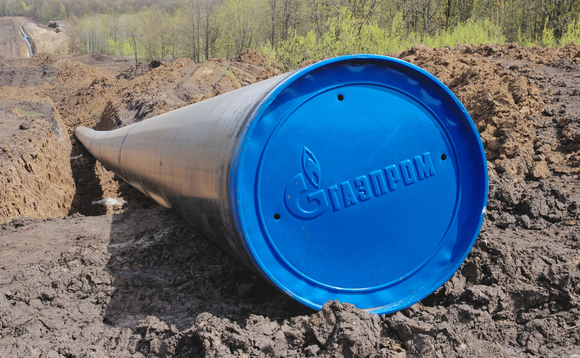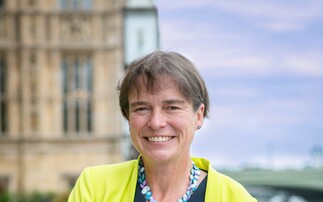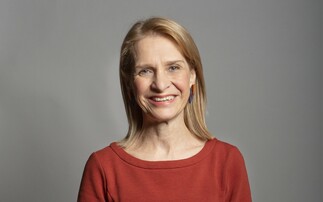A gas pipeline under construction in Russia | Credit: iStock
'There are big challenges ahead, but the only option is to double down on our goals: for Ukrainians, for Europe, and for the planet'
Vladimir Putin appears to have unwittingly accelerated the clean energy transition worldwide, with fresh analysis today providing yet more evidence that some of the world's largest economies have reduced their reliance on fossil fuels in favour of increased investment in renewables since Russia's invasion of Ukraine a year ago.
The Kremlin had banked on its weaponisation of energy supplies to impose economic costs on the West and undermine its support for Ukraine. But new analysis today highlights that while fossil fuel prices spiked in the wake of Russia's illegal invasions, western economies have managed to quickly curb their reliance on Russian oil, gas, and coal.
According to research group Zero Carbon Analytics, the European Union has already substituted almost 75 per cent of Russian fossil gas imports with alternative sources of energy, while global gas demand has plateaued for the first time and is now forecast to peak by the end of the decade.
At the same time, it predicted 88 per cent of the growth in electricity demand worldwide is expected to be met by renewables over the next three years, compared to just one per cent from fossil fuels, it points out, echoing similar recent forecasts from the International Energy Agency (IEA).
The projections suggest the world is set to add more renewable power over the next five years as it did over the past 20, helping to reduce ecomomies' exposure to volatile, risky and expensive fossil fuel energy markets while also helping to bring forward a peak in overall carbon emissions.
Meanwhile, the IEA has also trimmed its projected fossil fuel demand growth for emerging Asian markets for 2021-2025 by 50 per cent compared to its forecast the previous year, the analysis added.
Commenting on the new analysis, IEA executive director Fatih Birol pointed out that before its invasion of Ukraine, Russia was "by far" the world's largest exporter of oil and fossil gas to global markets, but now "its standing has severely diminished".
"At the same time, the cleaner alternatives to Russian fossil fuels are growing rapidly as governments seek to strengthen their energy security amid the crisis," he added. "Renewable power capacity added worldwide rose by about a quarter in 2022. Global electric car sales leaped by close to 60 per cent, investments in energy efficiency jumped, as did installations of heat pumps. And now, nuclear power is making a strong comeback."
The analysis is in part based on fresh research released today by think tank Ember, which estimates that increases in wind and solar generation in Europe has helped the bloc save €12bn in avoided gas costs since Russia invaded Ukraine last year.
Ember said wind and solar generation in Europe had increased by 50TWh since the conflict began in February 2022, helping renewables to take a record 23 per cent share of the continent's power mix, overtaking the share of gas for the first time, which provided 19 per cent.
"Governments are due credit in how they have responded to this unprecedented and complex energy crisis," said Birol. "My hope and expectation is that they don't stop now. Instead, they must push on to further accelerate clean energy transitions. Not only is this important to reduce emissions but also because the crisis has shown us that faster transitions enhance energy security, create jobs and spur industrial growth."
The report follows separate analysis from BloombergNEF earlier this week, which forecasted renewables are now on track to become Europe's fastest-growing power source, with solar capacity expected to expand by 45 per cent and wind power capacity by 15 per cent from 2022-2024.
BloombergNEF said Russia's war in Ukraine had prompted Europe to accelerate its renewables roll out with the sector overtaking nuclear as the continent's biggest single power source. Coal power capacity simultaneously fell to its lowest level since 2016.
Europe is now on track to scrap half its coal plants by 2030, despite a short lived increase in coal generation as government's briefly turned to coal power in response to soaring wholesale gas prices.
"The region's coal capacity under construction was cut by half between last July and January, while total operating capacity fell to the lowest since we started tracking it in 2016," said Bloomberg Intelligence ESG analyst Michelle Leung. "Poland's state-owned PGE is Europe's largest coal-fired utility with a nine per cent share of capacity, followed by Germany's biggest generator RWE at 8.9 per cent, the Europe Beyond Coal database shows."
Today marks the one-year anniversary of Russia's tanks first rolling into Ukraine, which signalled the start of the bloodiest conflict on European soil since the end of the Second World War.
Laurence Tubiana, CEO of the European Climate Foundation - and a key architect of the 2015 Paris Agreement - said Russia's invasion of Ukraine had "rewritten Europe's story" and firmly underscored how clean power sources were a tool for supporting peace.
"Its foundations are the courage of Ukrainians and the need for a new geopolitics of renewable energy: where gas must not be weaponised, and autocrats must not be bankrolled with blood money," she said. "More than ever, the European Green Deal is a peace project. It has emerged stronger through this brutal war. There are big challenges ahead, but the only option is to double down on our goals: for Ukrainians, for Europe, and for the planet."









